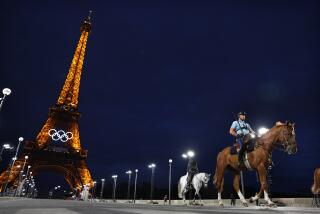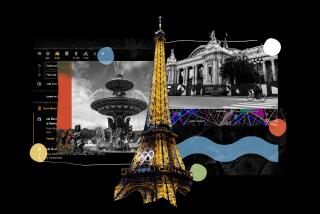Tour starts on long road to recovery
- Share via
LONDON — They’re starting another Tour de France today even if nobody’s talking about the tour part or the France part and everybody’s talking about the security and the doping.
As the first of the 94 editions to begin in England, the event finds itself not only beginning on the two-year anniversary of the London subway bombings that killed 52 people, but at the edge of Trafalgar Square, just paces from where authorities defused car bombs outside a nightclub June 29.
With electronic signs dotting the English capital to give traffic instructions for a French event, and with the two countries cooperating on organizing security, London Mayor Ken Livingstone has deemed the Tour de France an apt primer for London 2012 Olympics security concerns.
The 4,000 to 5,000 officers must patrol a 4.9-mile course for the prologue set for today, then a 128-mile course for Sunday’s first stage of the race, set to cross the Thames River three times and the Tower Bridge once for the ultimate photo-op of the 21 teams and 189 riders.
“We are attentive but not worried,” Pierre-Yves Thouault, director of security for the Tour, told the Associated Press. “The Tour has never been targeted.”
About 20,000 people attended an opening ceremony Friday night, with much larger numbers expected today and Sunday, while a prime focus remains on who will not attend.
Those not attending include the defending champion, Floyd Landis, still awaiting the outcome of an arbitration hearing after he tested positive for testosterone.
They include Ivan Basso, who might’ve been a favorite had bags of his blood not turned up in the office of a Spanish doctor known to work with at least 58 riders.
They include Jan Ullrich, the 1997 champion, who retired last winter after spending the last Tour banished in the same doping cloud as Basso, and the subject of recent claims by a masseur who says he injected him with the performance-enhancing drug EPO.
And they include Bjarne Riis, no longer a rider but a manager for Team CSC, and who in May acknowledged his 1996 Tour title came with the help of EPO.
This would be the sporting event for which all the participants have signed forms declaring they’re not using performance-enhancing drugs.
“Really there is nothing else we can do except having riders declare they are not involved in a doping scandal,” said Johan Bruyneel, the manager of Team Discovery for which seven-time winner Lance Armstrong and Landis both raced. “If they do that and are found not clean, there should be a very substantial financial fine. Pay one year of salary.”
Nine years after the so-dubbed “Tour de Dopage” of 1998 presaged a near-decade of suspicion, they’re still planning to hold a race. It will begin in earnest Sunday and end three Sundays later in Paris.
It does have a favorite, and he’s from Kazakhstan -- the real one, not the fictitious one of “Borat.” Racing for the Astana team, Alexandre Vinokourov, 33, finished third in 2003 and fifth in 2005. Of the four riders banished because of Operacion Puerto just before the 2006 event, he’s the only one who’ll appear in 2007.
“I think the big danger is Astana with Vino and Kloeden,” Bruyneel said, referring to Andreas Kloeden of Germany, twice on the podium with a second-place finish behind Armstrong in 2004 and a third-place finish behind Landis and Spain’s Oscar Pereiro in 2006.
Pereiro returns as the man who could be defending champion if Landis loses his appeal and has his title stripped.
Some of the shifts in the sport have lent more prominence to the American Levi Leipheimer, sixth in 2005.
Leipheimer, 33, who hails from Outlook, Mont., considers it a “dream” to lead the Discovery team, and finds the Tour undiminished.
“It’s a great event, it’s unlike any sporting event in the world,” he said. “It’s three weeks long, extremely arduous, and to win the Tour is always a great, huge achievement. I can tell you every single rider who takes the start is extremely good, strong, among the 200 best in the world.”
It’s a race for which such pure sporting talk seems almost outdated.
--
Times staff writer Diane Pucin contributed to this report.
--
2007 Tour de France
A look at some of the key riders and stages in this year’s Tour:
When: Today-July 29.
Race profile: Today’s prologue is followed by 20 stages, covering a total distance of 3,550 kilometers (about 2,206 miles) and ends in Paris along the Champs-Elysees.
Participants: 21 teams of nine riders.
Riders to watch: Alexandre Vinokourov (Astana); Carlos Sastre (CSC); Alejandro Valverde (Caisse d’Epargne); Cadel Evans (Predictor-Lotto); Andreas Kloden (Astana); Levi Leipheimer (Discovery); Denis Menchov (Rabobank).
Can’t-miss days:
* Today’s prologue (7.9 kilometers, or roughly 4.9 miles). The individual time trial rolls through the streets of London, marking the first time the Tour has been there.
* Stages 7-9 on July 14, 15 and 17. Welcome to the Alps and the real start of the race for the overall winner. Stage 9, after the first of two rest days, is one of the shortest stages (159.5 kilometers or about 99 miles) but features two beyond-category climbs, the Col de L’Iseran and the Col du Galibier.
* Stages 14-16 on July 22, 23 and 25: More mountains, this time the Pyrenees. Stage 14 ends with a steep climb to Plateau de Beille, Stage 15 has five classified climbs and, after a rest day on July 24, the riders have 218.5 kilometers (almost 136 miles) with four classified climbs, including perhaps the toughest of the race, the Col de Larrau.
Source: St. Petersburg Times
More to Read
Go beyond the scoreboard
Get the latest on L.A.'s teams in the daily Sports Report newsletter.
You may occasionally receive promotional content from the Los Angeles Times.










